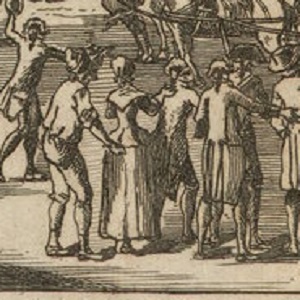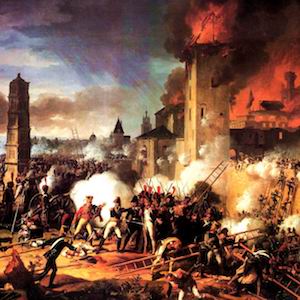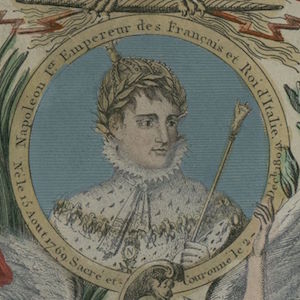Military

Arrest of the King at Varennes, 22 June 1791
These images, all engraved and widely circulated years after the event, show four different moments of the arrest. Each successive image renders the scene increasingly dramatic. The first, a woodcut executed shortly after the event, shows the postman alone recognizing the King.

Battle For and Taking of Ratisbon, April 23, 1809
The general peace agreement lasted a scant two years after the treaty of 1801.

Sire, They Are My Sons and My Wife
Napoleon cultivated the intense personal loyalty of his troops with engravings like this one, which suggests a personal interest in the ordinary soldier.

Meeting of the Emperors at Tilsit
In July 1807, Napoleon and Alexander agreed to cooperate. Napoleon used this strategy to prevent his enemies from forming an alliance against him.

The Royal and Imperial Family of Napoleon
The remainder of the text on this image reads: Emperor of the French, King of Italy, and Protector of the Confederation of the Rhine. The military flags make clear the connection between military conquest and imperial glory.

Retreat from Russia
There was not much to celebrate in the Russian campaign, especially once the retreat from Moscow began. Print depicting the horrific conditions and loses suffered by the French army as it retreated from Moscow in the winter of 1812.

The Day after Waterloo
Thousands died or were wounded in the fighting that began 15 June and ended at a series of farmhouses at Waterloo on 18 June 1815.

The Marseillaise
A similar emphasis on patriotic unity can be seen in Jean Renoir’s film, La Marseillaise (1938). The movie tells the story of France’s national anthem, composed by Rouget de Lisle as a way to rally the troops. The song, written for soldiers from Marseillaise, soon inspired the entire nation.

Napoleon in Italy 1796-97
Map depicting Napoleon's campaigns in Italy, 1796-97.
This source is a part of the The Napoleonic Experience teaching module.

Napoleon’s Egyptian Campaign
Map depicting Napoleon's Egyptian campaigns.
This source is a part of the The Napoleonic Experience teaching module.